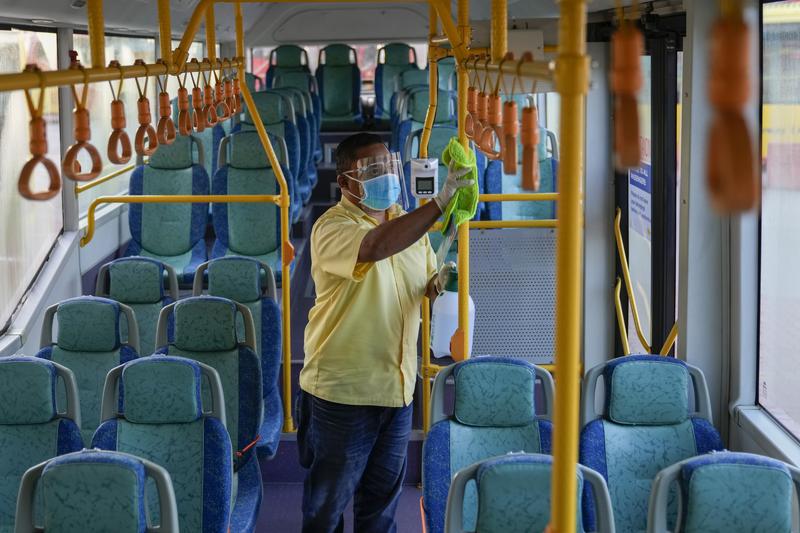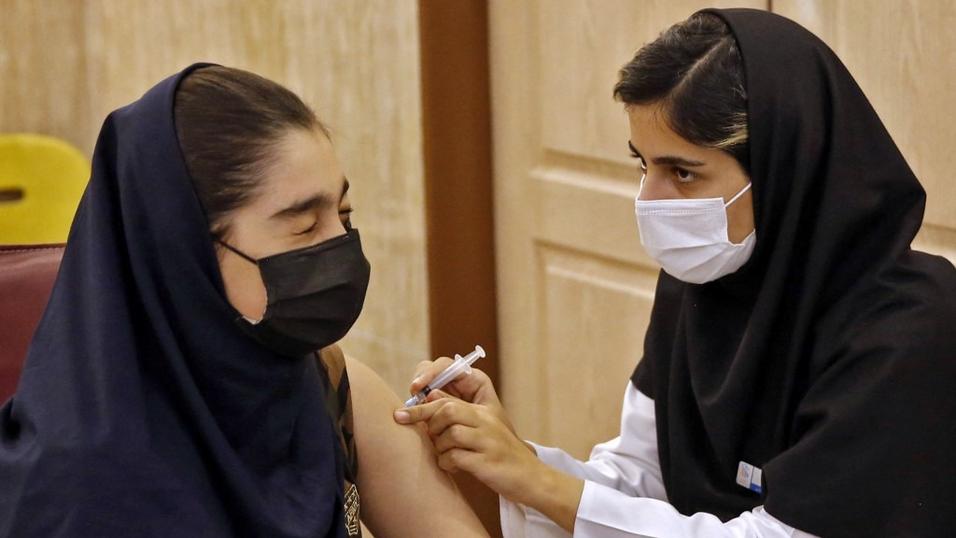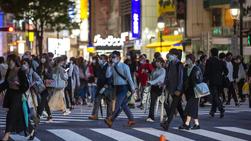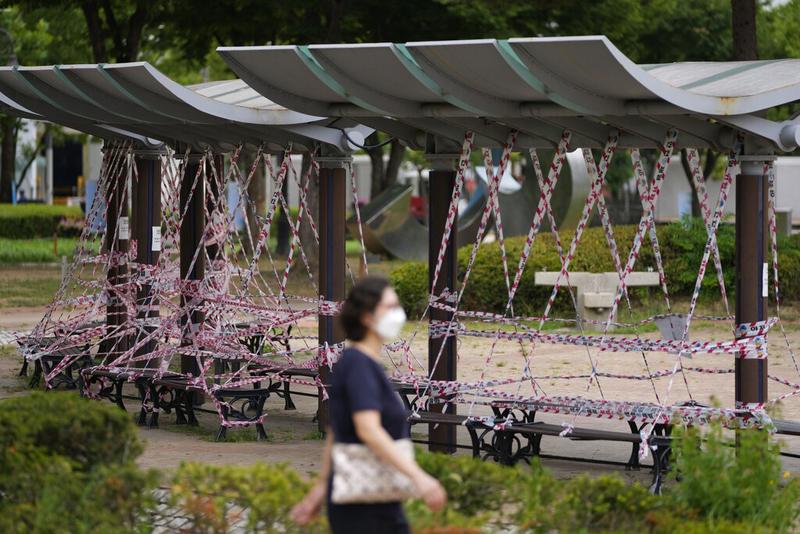 A bus driver sanitizes the interior of a bus before passengers' boarding at Larkin bus station in Johor Bahru, Malaysia, Nov 29, 2021. ( VINCENT THIAN / AP)
A bus driver sanitizes the interior of a bus before passengers' boarding at Larkin bus station in Johor Bahru, Malaysia, Nov 29, 2021. ( VINCENT THIAN / AP)
BEIRUT / CAIRO / KUALA LUMPUR / TEHRAN / SINGAPORE / TOKYO / WELLINGTON - Malaysia has temporarily banned the entry of travelers from countries that have reported the Omicron COVID-19 variant or are considered high-risk, its health minister said on Wednesday.
The travel ban applies to eight African countries, including South Africa, Zimbabwe, Mozambique and Malawi, but could be extended to other nations where the variant has been detected, such as Britain and the Netherlands, health minister Khairy Jamaluddin said.
Malaysia will also delay plans to set up so-called Vaccinated Travel Lanes with the affected countries, and reimpose quarantine requirements for Malaysian citizens and long-term residents returning from those nations, regardless of their vaccination status.
Malaysia, which has reported more than 2.6 million coronavirus cases, has gradually reopened its borders to travelers in recent weeks as infections have slowed amid a high vaccination rate.
India
India will bolster COVID-19 genome sequencing efforts, hoping early detection of the newly-emerged omicron variant will help avoid a repeat of the delta-fueled wave of infections that brought its health system close to collapse earlier this year.
Public health officials aim to analyze positive tests from airports within 48 hours and a dozen laboratories may be added to the current 28 that are part of the Indian SARs-COV-2 Genomics Consortium, or INSACOG, according to Priya Abraham, director of India’s National Institute of Virology.
India’s health ministry on Tuesday asked state governments to boost testing and send all positive COVID samples to INSACOG labs for sequencing. Health minister Mansukh Mandaviya told parliament that all precautions were being taken.
Despite the moves to ramp up both testing and sequencing, some health officials and experts speculate that omicron may already be circulating in the nation.
 A student reacts as she receives a COVID-19 coronavirus vaccine dose at a vaccination center set up inside a school in Iran's capital Tehran on Oct 7, 2021. (PHOTO / AFP)
A student reacts as she receives a COVID-19 coronavirus vaccine dose at a vaccination center set up inside a school in Iran's capital Tehran on Oct 7, 2021. (PHOTO / AFP)
Iran
The Iranian Health Ministry reported on Tuesday 4,253 new COVID-19 cases, taking the country's total infections to 6,117,445.
The pandemic has so far claimed 129,830 lives in the country, after 119 new deaths were registered in the past 24 hours, said the ministry on its website.
A total of 5,883,470 people have recovered from the disease or been discharged from hospitals across the country, while 3,334 remained in intensive care units, it said.
Israel
Israel’s coronavirus czar Salman Zarka said the country should look at mandatory vaccination now that the Omicron variant has emerged. “Mandatory vaccination needs to be considered, whether through legislation or otherwise, especially given the fact that not only is the pandemic here, but I fear it will get worse,” Zarka said on 103FM radio. He said he changed his mind following the appearance of omicron, which has been identified in several Israelis.
 People at a cross junction in Shibuya, Japan, Oct 1, 2021. (KIICHIRO SATO / AP)
People at a cross junction in Shibuya, Japan, Oct 1, 2021. (KIICHIRO SATO / AP)
Japan
Japan began on Wednesday to administer COVID-19 booster injections to people who finished the full two shots at least eight months ago amid increasing concerns over the new Omicron variant of the COVID-19, the government said.
The third dose of the vaccine developed by Pfizer and BioNTech SE were provided to health care professionals across the country. The elderly and others are expected to receive booster injections from January.
Japan has found a second person who has tested positive with the COVID-19 Omicron variant, broadcaster FNN reported on Wednesday
Although the effectiveness of the booster shots remains unknown against the new Omicron variant, Prime Minister Fumio Kishida has decided that Japan will administer the booster shots as scheduled, as vaccine-induced immunity against infection was confirmed to weaken over time.
Individuals aged 18 or above will be eligible for the third injection, under Japan's current policy, and especially those who are at higher risk of severe symptoms such as the elderly or those engaged in high-risk occupations will be especially encouraged to get a booster shot.
The government approved the Pfizer vaccine as the only vaccine to be used for the booster injection so far. It added that the booster vaccine can be a different brand from the previous two injections.
Japan has found a second person who has tested positive with the COVID-19 Omicron variant, broadcaster FNN reported on Wednesday.
Lebanon
Lebanon on Tuesday registered 1,618 new COVID-19 cases, raising the total number of infections in the country to 670,656.
Meanwhile, death toll from the virus went up by 9 cases to 8,725, the Lebanese Health Ministry reported.
The ministry noted that the PCR positivity rate in Lebanon stands at 9.8 percent.
Lebanese Health Minister Firas Abiad aims to boost the COVID-19 vaccination campaign in a bid to curb the pandemic, as Lebanon's health sector is suffering from the unprecedented financial crisis.
New Zealand
New Zealand reported 146 new Delta variant cases of COVID-19 in the community on Wednesday, bringing the total number of confirmed cases in the country's current community outbreak to 8,574.
Among the new infections, 124 were recorded in the largest city of Auckland, 14 in nearby Waikato, four in Bay of Plenty and four in Nelson Marlborough, according to the Ministry of Health.
The total number of confirmed COVID-19 cases in New Zealand stands at 11,353 currently, according to the health ministry.
READ MORE: Australia, NZ tighten border curbs against new virus variant
The Philippines
Millions of Filipinos face having to pay for their own COVID-19 tests as a new rule mandating vaccines in workplaces comes into force, even as essential workers in some parts of the country struggle to access shots.
As of Wednesday, businesses will require employees entering offices to factories to be inoculated against the virus. The rule is being enacted despite the Southeast Asian nation having one of the lowest vaccination rates among major economies, with just 41 percent of the population inoculated.
Restaurants and government agencies will also be allowed to refuse entry or deny service to individuals who remain partly or wholly unvaccinated, with the measures part of a wider push by the government to boost the overall vaccination rate.
Saudi Arabia
Saudi Arabia confirmed its first case of the Omicron COVID-19 variant coming from a north African country, state news agency SPA reported on Wednesday.
SPA, quoting a statement from the kingdom's health ministry, said authorities had isolated the person and people who were in contact with them.
It is the first Omicron variant case reported in the Middle East and North Africa. The ministry said the person was a Saudi national who had traveled from a North African country, without giving further details.
The Saudi ministry urged people to complete their vaccination and ordered travelers to respect self-isolation and testing rules.
Singapore
Singapore's COVID-19 vaccination rate has risen to 96 percent of the eligible population and authorities are now racing ahead to administer booster shots amid concerns over the Omicron variant.
The health ministry of the city-state, which has among the highest vaccination rates in the world, said late on Tuesday that it had updated the official vaccination rate to account for a small drop in the population.
Singapore had barred unvaccinated people from entering shopping malls from mid-October, and authorities have said they will further tighten rules from Jan 1, including only allowing vaccinated individuals to enter workplaces.
 A visitor wearing a face mask walks near benches which are taped off for the social distancing measures and a precaution against the coronavirus at a park in Anyang, South Korea on Aug 13, 2021. (LEE JIN-MAN / AP)
A visitor wearing a face mask walks near benches which are taped off for the social distancing measures and a precaution against the coronavirus at a park in Anyang, South Korea on Aug 13, 2021. (LEE JIN-MAN / AP)
South Korea
South Korea's daily number of COVID-19 cases hit a record high as the government eased anti-pandemic measures amid the higher vaccination rate, the health authorities said Wednesday.
The Korea Disease Control and Prevention Agency on Wednesday reported a record 5,123 new COVID-19 cases and 723 critical patients
The Korea Disease Control and Prevention Agency on Wednesday reported a record 5,123 new COVID-19 cases and 723 critical patients. Authorities are investigating a suspected Omicron infection and test results are scheduled to be announced later today, according to the agency.
The new infections surged for the past month as the government alleviated quarantine measures last month amid the higher vaccination rate.
Of the new cases, 2,212 were Seoul residents. The number of the newly infected people living in Gyeonggi province and the western port city of Incheon was 1,576 and 322.
The virus spread also raged in the non-metropolitan region. The number of new infections in the non-capital areas was 965, or 19 percent of the total local transmission.


